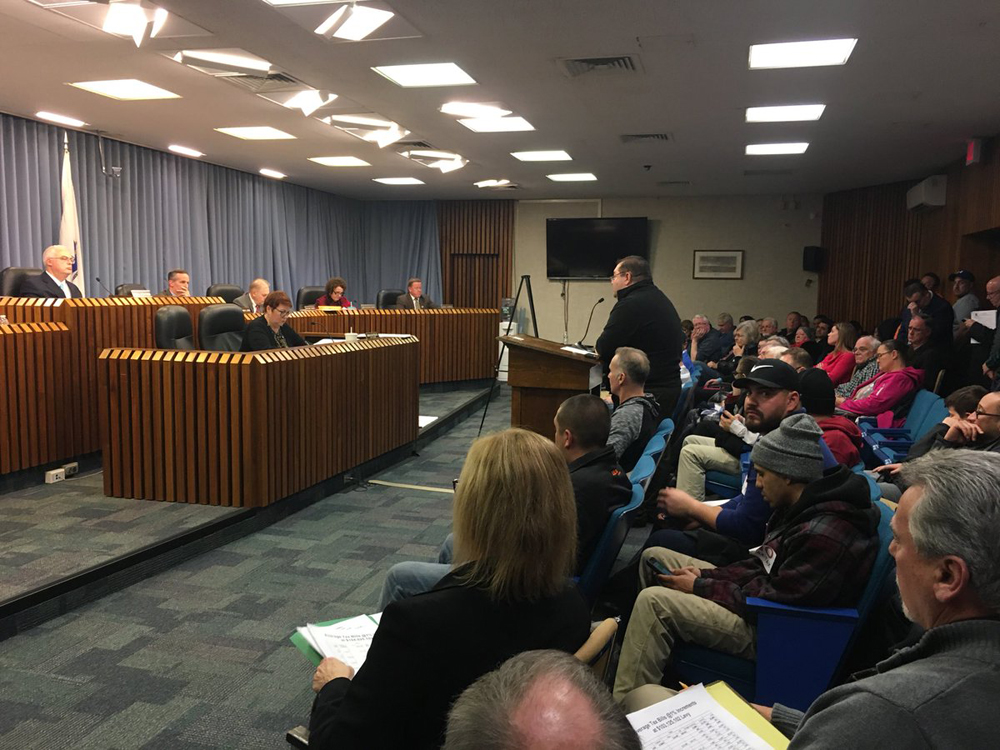Haverhill Education Association President Ted Kempinski spoke before the City Council to argue for taxing to the state’s Proposition 2 ½ limit. (Alex Guittarr photograph for WHAV News.)
The City Council came to an agreement on Tuesday for a new tax plan that would raise taxes for residents and businesses and grant funds to improvement projects across Haverhill.
During the council’s latest meeting, members supported two motions to use $500,000 of city surplus funds to offset the state’s Proposition 2 ½ tax limit of $104 million and set a residential factor that would establish a residential tax rate of $13.96 and corporate, industrial and personal, or CIP, tax rate of $25.33. A third motion was also supported to use $1.5 million in city surplus funds for improvement projects, including repairs for the city’s schools. The meeting was standing room only, as supporters and opponents of taxing to the state limit filled the council chambers to have their voices heard. Haverhill resident Joy Smith opposed taxing to the limit by saying she has trouble affording the continued tax increases, even if other residents do not.
“It may be a cup of coffee to you, but that is something that I put in my savings to do my driveway, to do my roof,” Smith said.
Haverhill Education Association President Ted Kempinski supported taxing to the limit by saying both schools and other groups like the Department of Public Works need more funds as Haverhill grows.
“So, it’s not just two schools and it’s not just roofs we’re talking about. It’s pathways [and] potholes,” Kempinski said.
The discussion came about after Mayor James J. Fiorentini vetoed the council’s original tax plan on Nov. 16. This plan would have taxed to the state limit and set the residential tax rate to $14.03 and the CIP tax rate to $25.26. Before he vetoed the plan, Fiorentini said this increase would have put “too great a burden on our struggling tax payers, especially those who live on a fixed income.”
During the meeting, Fiorentini went after the argument that Haverhill’s school roofs could be fixed with more funds from raising taxes, which became prevalent again after severe roof leakage occurred at Consentino Middle School on Nov. 19. Fiorentini said the issue was more related to poor management within Haverhill Public Schools than taxes. The mayor also touted a recent online poll of almost 1,800 residents where 82 percent of respondents opposed taxing to the state limit.
Council President John A. Michitson argued not taxing to the state limit has already costed Haverhill $8.6 million in potential revenue in the past and would also lose the city millions more if it was done again for the 2019 fiscal year. Michitson also argued those millions of dollars could be used to fix Consentino immediately, saying “right now, we could do that, if we didn’t give relatively small tax breaks for several years in a row.”
Attempts to override Fiorentini’s vetoes of the original tax plan failed when the council could not get the six votes needed to undo the mayor’s vetoes of the original two motions that made up the first tax plan. Council President John A. Michitson and Councilors Melinda Barrett, Colin F. LePage, Timothy J. Jordan and Michael S. McGonagle voted to override both vetoes, while Council Vice President Thomas J. Sullivan and Councilors Joseph J. Bevilacqua, William J. Macek and Mary Ellen Daly O’Brien voted against overriding the vetoes. Additionally, the council unanimously voted to increase the exemption for personal property tax for small businesses from $3,500 to $5,000 annually at the suggestion of the mayor.

